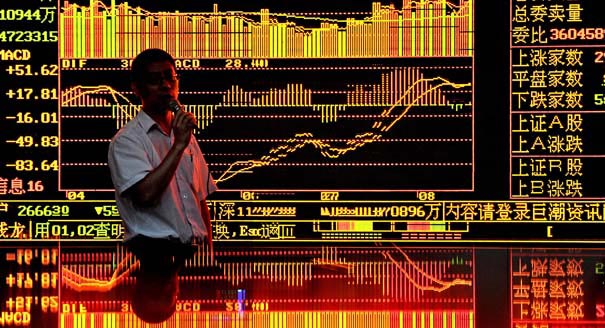In his last formal speech as China’s premier before handing over to his successor, Wen Jiabao announced that the 2013 growth target for China’s economy was 7.5 percent. In each of the thirty years leading up to 2011, the country’s economic growth has easily exceeded the target set by the government.
But this year something strange happened. Premier Wen warned that it would be difficult to achieve the 2013 growth target. There was, he said, “growing conflict between downward pressure on economic growth and excess production capacity.” In other words, China is producing far more than it can absorb, yet the only way to keep growth high has been to invest in even greater production capacity.
What happens if China stops investing? Last year its official growth rate was 7.8 percent—above the 7.5 percent target set early in the year but far lower than the 10 percent rate China had achieved for the past two decades. This suggested that rebalancing the Chinese economy—a goal that has been actively proclaimed since 2005 but that had never been met until 2012—was proving more difficult than expected.
But even with slower growth, throughout the year economists were puzzled by evidence that the economy was in fact growing much more slowly than the official numbers suggested. Energy consumption in China, for example, has risen more quickly than GDP for as long as we have had records. But in 2012 energy usage grew by only 5.5 percent, well below the official growth rate of 7.8 percent.
While economists at the large foreign banks continued to insist that China’s growth remained very high and very healthy, there was increasing skepticism among independent Chinese and foreign economists who specialize in the Chinese economy. A consensus is developing that China in fact grew by a lot less that 7.8 percent in 2012. It might have grown by as little as 5 percent.
An explanation for this inconsistency might lie in the way growth was distributed throughout 2012. Everyone agrees that the economy grew far more slowly in the first half of 2012 than in the second half. From January to June, the authorities managed to slow the growth in debt, which has been rising at alarming rates in the past decade, especially since 2009.
In a system in which almost all growth is investment-driven, and in which a rising share of investment is wasted on factories, bridges, real estate, airports, and other projects, burgeoning debt can be a very worrying problem if the ability to service that debt is rising much more slowly than the debt itself.
This is why Beijing was so eager to slow the growth in debt. But as it did so, growth seems to have collapsed. This is not surprising if the main source of growth is investment. By the middle of 2012, growth had decelerated so quickly—even if the lower rate did not show up in the official statistics—that Beijing might have become nervous and begun to allow credit to grow rapidly again.
The result in the second half of the year was a growth surge, which has continued into 2013. But this growth came at a huge cost. The total debt in the system, especially in the unregulated parts of the financial system, has grown at a record-breaking pace.
Beijing understands the dilemma it is facing. It must reduce investment and slow the growth in debt, but if it does so it will face stiff opposition from vested interests and will suffer much lower growth than it has become used to.
If Beijing is able to move forward as it wants, I expect that growth will slow sharply in the second half of 2013, although the official numbers may understate the slowdown. If it is unable to move as quickly as it wants—perhaps because the opposition is too strong and it is unable to fully consolidate power—growth rates will stay high in the second half of the year, but the growth in debt will cause economists even more worry and concern.
2013, the Year of the Snake, is a very important year for China. It will determine whether or not China’s great surge can be continued in a sustainable way. People born in a year of the snake are assumed to be crafty and tend to do well financially. Beijing will need all its craftiness to ensure that this year is a financial success.





.jpg)
